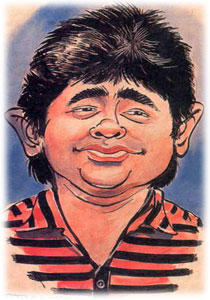IF Karratadipalayam village in Erode district did not have a statue, it is high time it had one. No, not of any political bigwig but of the late Professor G.V. Loganathan, one of the victims of the horrible shootout at the Virginia Tech university in the U.S.
Men like Loganathan represented the best that India ever produced and sent abroad. They did us proud in everything they did, maintaining high standards in life and work and symbolised how talent can overcome problems like poverty and lack of opportunities at home.

Similar experiences
I can visualise how Loganathan spent his early days. Studying in a Tamil medium government school in Modakuruchi near Coimbatore, he must have walked to school and back, probably barefoot and denied such luxuries like ironed clothes, pocket money or entertainment like cinema. His only focus must have been high grades in school and later, college. There is something very similar to my own middle class upbringing and the P.S.G. College of Technology where he studied was familiar to me. I once played some cricket matches there for my alma mater, Government Victoria College.
Loganathan's association with Purdue University, where he completed his Ph.D., also brought back memories. Only last November I spent nine days at this university town with a large Indian student population and noted for its engineering courses. The academic life and environment were invigorating and offered me some clues to the real greatness of the U.S. to which men like Loganathan contributed.
Encouraging ambience
American universities woo, recruit, and nurture academic talent from all over the world and India has been one of the best happy hunting grounds. Once such intellectuals were brought to campus life, they worked in an enviable environment of academic freedom, high salaries and a way of life which allowed them to focus on their jobs. The likes of Loganathan responded warmly and the U.S. reaped the benefits. What are the benefits? Great academic research, honours and Nobel Prizes.
The importance of academic freedom cannot be underestimated. The faculty finalise the syllabi, recruit the best available talent, grade the students while the college administrators collect funds which are mostly used for academic purposes. At Purdue, and I am sure it must have been the same at Virginia Tech, I witnessed instances of this academic freedom. The easy, informal relationship between the teachers and the taught appealed to me. Students wore shorts and T-shirts and discussed issues with the faculty over glasses of beer.
Academics like Loganathan no doubt taught classes, held examinations and graded students. But I found on U.S. campuses that the good teachers encouraged students to think independently. They threw ideas in the class, sat back and listened to animated discussions. Projects which revolved around new ideas got better grades. Out of this approach emerged new ideas which are the basis of a sound education. The faculty is quick to recognise that there could be several approaches to one issue. Here in India, quite often, teachers discourage students from thinking independently and not reproducing exactly what had been taught to them in class. Our academic stagnation is mainly due to such an approach.
True to origins
Despite the adulation he received abroad, like many other Indians, Dr. Loganathan at heart remained an Indian, visiting his hometown regularly and asking his parents to join him in the U.S. Obviously, the parents were not in favour of such a changed life and chose to remain at home. It is a tragedy that their first-ever visit out of the country should be for the final rites of their distinguished son. But every one of us should be proud of the tribute paid to the late professor by Dr. Wlliam Knocke, head of the department where he worked. "Dr. Loganathan was one of the truly great class room educators within the College of Engineering. He combined a high degree of organisation in the class room, expert knowledge of the subject matter and a passion for student success into classroom experience."
Yet, it was the very same university and the student population which produced 23-year-old South Korean Cho Seung-Hul. We do not know what evil passions raged in his mind to shoot and kill 33 young people. U.S. campus life, at least on the surface, appeared to be happy and lively. Cho, a student of English literature, might not have even known Dr. Loganathan. But that is the irony of life. We share the sense of loss felt by his family and his university.

No comments:
Post a Comment